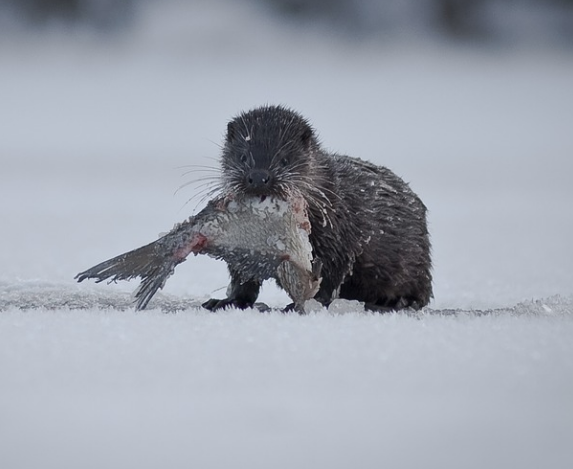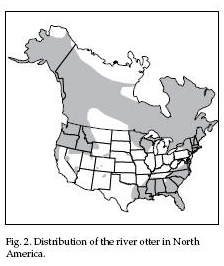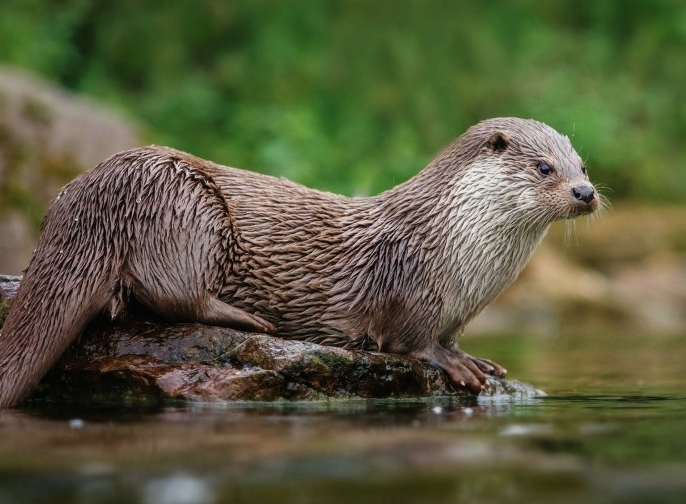What an Otter Shambles. At least that is what the headlines should read about the recent koi loss tragedy at the Dr. Sun Yat-Sen Classical Chinese Garden in Vancouver’s Chinatown. Otters (well, one really) have dominated koi news recently.
An otter moved into a pond in the Vancouver Chinese Garden and wreaked havoc in the beloved (and valuable) population of koi that had been in it for quite some time. In a matter of days, an otter had eaten 10 koi fish in the pond.
Traps for the otter were set and the remaining koi relocated. However, as otters generally do when they move in, it decimated the koi population and evaded capture. Only two koi remain.
The story captivated the Canadian public and even made it into Time Magazine. It sparked pro-otter and pro-koi divisions and even came with buttons–one cheering on the otter and the other the koi. And it garnered its own Twitter hashtag #Otterwatch2018.
Celebrities like Ed Sheeran, however, don’t seem as fazed. The Telegraph reported in 2017 that the musician continued to stock his pond with koi even after he had discovered that an otter was dining on them. This incurred the ire of many koi kichi when it was made public.
Otter Nuisances
To koi enthusiasts, saying that otters, a member of the Mustelidae family, are a nuisance is the nicest way possible to describe this unholy combination of a whispering-death and infuriating-capture-avoidance machine.
To the casual observer, otters might seem adorable and cuddly with enviable intelligence and amazing problem-solving capabilities. But, many koi keepers who have had run-ins with otters will regale with horror stories of how destructive the semi-aquatic mammal can be.
Otters are extremely intelligent and persistent killers. And ingenious hunters. They are also masters at evading traps. An otter can clear out a pond with consummate ease and speed, despite your best efforts to keep it at bay.
Otters require quite a bit of food (up to 25% of their own body weight daily) to get the calories they need to survive. They get upwards of three feet long and weigh anywhere from 10-30lbs, so they will clear through a pond quickly to get the sustenance they need.
Otters can hold their breath for up to four minutes and reach depths of 250 feet. The fact that your koi are constrained by the size and depth of your pond makes them easy targets for this agile predator. Otters will not resist a ready and accessible meal.
And, no, neither winter nor ice on the pond’s surface will keep an otter at bay. Apart from having some of the densest fur in the animal kingdom to keep them toasty in your frozen pond, they either exploit weaknesses in your defenses or just find ways around them. Koi owners will tell you that otters can and will find a way under the ice even if you haven’t bubbled a hole for gas exchange.
Ordinarily, otters are nocturnal hunters, but in the colder winter months, they use the warmth of the day to do their hunting.
How Do I Know It’s An Otter?
Remains
Unlike heron that will swallow your koi whole, an otter, once full, will leave remains of a koi or fish. Any of your koi that manage to get away will have deep bite marks on them. Herons will leave parallel spear marks.
Spraint
Otters will leave a tar-like, floral-scented feces on rocks or paving around the pond. The spraint might have bones or scales in it.
Slides
Otters may create muddy slides in patches around waterways. These are for quick access to the water.
Check open areas under your house (like porches or spaces under sheds). If you have hunting blinds near your home or a boathouse near you, otters will sometimes set up shop here.
If you are visited by an otter, it might not be alone. You might actually be dealing with a family of them. Otters can live in groups, so when you think you have gotten rid of your problem you could still have more with which to contend. So how do you keep otters out?
Otter Deterrence
You cannot outfox this semi-aquatic fox. If there is a way around, under or through the barrier to its meal, an otter will find (or create) it.
Otters are an endangered species in many places, and as such, have to be removed and relocated humanely by experts or wildlife wardens. Some states only allow trapping at certain times of the year (which doesn’t help your koi!).
Nets
These really don’t pose much of a deterrent to otters, especially netting with large gaps. Otters may look big (no, it’s the fur, really), but they can squeeze through small cracks (up to 100mm). Heavy gauge or wire netting (which is less aesthetically pleasing) can be more effective if used in conjunction with other deterrents.
Fencing
Fencing can be an effective deterrent against otters. If you opt for regular fencing, it is recommended that you dig the bottom of the fence up to a foot into the ground. Additionally, using chicken wire (or wire with small spacing) is good to put around the bottom of the fence up to three feet off the floor.
If you want electric fencing, there are a lot of provisos that koi keepers will quickly note. They include:
- Keep off debris—the wire will have to be free of sticks, grass or anything resting against it. Anything resting on the wire lessens the jolt.
- Number of wires—two wires are better than one (6” and 10” off the ground)
- Adequate voltage—it’ll have to be enough to deter (a hungry otter will take the voltage to get to the prize).
- Mark it well—lest ye be zapped.
- Check it often—make sure it is working properly.
- Den Exclusion
This involves finding out where the otters live and making it an untenable living situation (raising their rent will not work!).
Find the entrances, plug them, and leave one open. Sprinkle something that makes their tracks visible (flour works). Stick an ammonia-soaked rag in the hole. Once the smell has driven them all out (hopefully!), plug that last hole.
Repellants
Otters have a highly developed sense of smell and experts believe certain scents are unpleasant enough to keep them away.
The scents of larger predators might have an effect on otters. Bears, coyotes and king snakes are all predators that they will not want to tangle with. However, as inquisitive and naturally curious animals, they sometimes might still investigate just to see what it is for themselves.
Again, these scents are not remarkably effective, and certainly not in one dose. You will have to apply them frequently.
It is believed that some strong smelling garden flowers (like lavender, peppermint, and garlic) can be helpful in keeping otters away. Citronella or lemongrass (as a plant or a spray bottle of extract solution) has been employed in defense against otters. Similarly, black pepper seeds and pepper spray can have the same effect.
Otter Trapping
Even trapping otters can be a difficult proposition. Trapping is probably best left to professionals, and your local environmental agency should always be consulted before attempting to remove an otter. You might need a permit.
There are numerous traps available (body grip traps, paw hold traps, and live cage traps) for both catch and release and lethal purposes. Each will have its own set of proponents and opponents–and lethal trapping is illegal in many parts of the United States.
Place the traps near heavily-frequented areas and use a bait that otters will find hard to ignore (strong smelling, oily fish like salmon or sardines). Once the otter is captured (cross fingers!), always wear gloves. A trapped animal is a dangerous animal.
The area to which it will be relocated has to be researched, too. The destination will have to be far enough away, and in an area well-enough stocked with food, to keep the otter from looking at your pond as a viable option again.
Once an otter has moved in, it has deemed your pond a good place to live, so even if that otter is removed, others will still find it to be inhabitable. This means that trapping and removal might have to be done routinely.
It is also worth remembering that if an otter clears your pond, it doesn’t mean that it won’t come back once you’ve restocked. Even if you haven’t seen any evidence of otters around your pond for some time, they will come back and start all over again once new koi are on the menu.
Relocation

Praying is not an effective measure against otters. So, in the interim, while you locate the otter, rehome your koi if you have the capability.
If you have a quarantine tank, use that. If you don’t have one, you can set one up for less than $300. It isn’t an ideal setup or situation, but it is more ideal (and probably less expensive) than having to restock, and definitely less stressful than coming out to less and less of the fish that you have come to know and love.
In times of extreme emergency, people have been known to fill up the bathtub, add dechlor and put an aerator in there. This can also mean moving koi to someone else’s pond if they can handle the extra fish load.
An otter is very much an unwanted and dangerous guest. When you build your pond, determine if this species lives in your region. Ask around your neighborhood to see if anyone has spotted an otter or has heard of someone witnessing one. Check with local wildlife agencies. If you are aware of otters you can plan your defenses accordingly before any heartache occurs.
Awareness and preparation will better keep your koi safe, and your stress level down!


I lost all my koi in a 7000 gallon pond in less than 2 days from a mink- in November before ice when they start to slow down. Devastated to say the least. I found him sleeping in the skimmer unexpectedly when I lifted the lid to clean the basket. Jumped up towards me to escape and of course sprayed. I restocked and the following fall I used Nite Guard solar powered flashers all around the pond. So far no return of any minks. The koi pond is in a yard surrounded by chain link fence is only 200 feet off a major river with plenty of predators. Some of my flashers are 2 years old and still working great. I move them around to keep the look changing. You can order Nite Guards from the manufacturer directly online and they are reasonably priced.
[…] Otters can hold their breath for up to four minutes and reach depths of 250 feet. The fact that your… […]